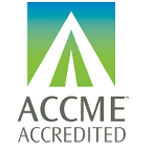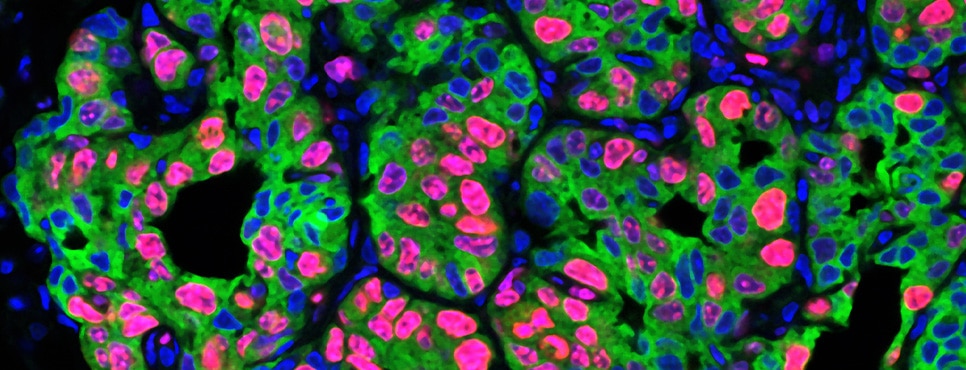Continuing Medical Education
Accreditation Statement

The American Association for Cancer Research (AACR) is accredited by the Accreditation Council for Continuing Medical Education (ACCME) to provide continuing medical education activities for physicians.
Credit Designation Statement
AACR has designated this live activity for a maximum of 20.50 AMA PRA Category 1 Credit(s)™. Physicians should only claim credit commensurate with the extent of their participation in the activity.
Credit certification for individual sessions may vary, dependent upon compliance with the ACCME Accreditation Criteria. The final number of credits may vary from the maximum number indicated above.
Claiming (CME) Credit
Physicians and other health care professionals seeking AMA PRA Category 1 Credit(s)TM for this live continuing medical education activity must complete the online CME Request for Credit Survey by January 2, 2025. Certificates will only be issued to those who complete the survey. Your CME certificate will be sent to you via email after the completion of the activity.

Successful completion of this CME activity, which includes participation in the evaluation component, enables the participant to earn up to 20.50 Medical Knowledge MOC points in the American Board of Internal Medicine’s (ABIM) Maintenance of Certification (MOC) program. Participants will earn MOC points equivalent to the amount of CME credits claimed for the activity. It is the CME activity provider’s responsibility to submit participant completion information to ACCME for the purpose of granting ABIM MOC credit.
To receive ABIM MOC, participants must request MOC in the CME Request for Credit Survey and complete all questions. Once these steps are completed, AACR will submit your completion information via the ACCME’s Program and Activity Reporting System for the purpose of granting MOC points.
Statement of Educational Need, Target Audience, and Learning Objectives
The tumor microenvironment, composed of normal cells, molecules, and blood vessels surrounding and nourishing tumor cells, plays a crucial role in cancer progression. While malignant cells with oncogene mutations or loss of tumor suppressors drive tumor growth, they are supported by various leukocytes, fibroblasts, endothelial cells (both blood and lymphatic), and other stromal components. Tumor blood vessels and the extracellular matrix have long been known to significantly impact disease progression. Recently, the roles of infiltrating immune cells, cancer-associated fibroblasts, macrophages, angiogenic endothelial cells, and stress responses to oxygen have gained recognition for their contributions to cell proliferation, evasion of growth suppressors, survival promotion, invasion and metastasis activation, and energy metabolism reprogramming.
The tumor microenvironment also influences cancer recurrence and chemotherapy resistance, as shown in ovarian cancer. Understanding tumor interactions with their microenvironment can lead to novel drug development and help overcome resistance to frontline therapies. AACR Special Conference on Tumor-body Interactions: The Roles of Micro- and Macroenvironment in Cancer will cover topics such as tumor microenvironment and metabolic adaptations, immune response, immunity and therapies, metastasis, hematopoietic and cell-cell signaling, carcinogenesis, and the translational potential and therapeutic targets within the tumor microenvironment.
Professional Practice Gap Analysis
To bridge the gap between scientists and clinician-scientists’ professional practice, this conference will provide a platform for discussion and initiating collaborations for the discovery of novel therapeutic targets.
After participating in this CME activity, physicians should be able to:
- Articulate the differences between organ-specific microenvironments.
- Discuss the effects of aging and stress.
- Distinguish between and identify Immunometabolism and metabolic macroenvironment.
- Interpret therapy induced changes in organ-specific microenvironments.
- Identify the multicellular interactions within the TME.
Disclosure Statement
It is the policy of the AACR that the information presented at AACR CME activities will be unbiased and based on scientific evidence. To help participants make judgments about the presence of bias, AACR will provide information that Scientific Program Committee members and speakers have disclosed all financial relationships they have with ineligible companies whose primary business is producing, marketing, selling, re-selling, or distributing healthcare products or services used by or on patients. All of the relevant financial relationships for these individuals have been mitigated
Acknowledgment of Financial or Other Support
The AACR gratefully acknowledges the following commercial supporters for their Professional Educational Grants:
- Pfizer
Questions about CME?
Please read our frequently asked questions. If you still have questions contact the Office of CME at (215) 440-9300 or [email protected].
